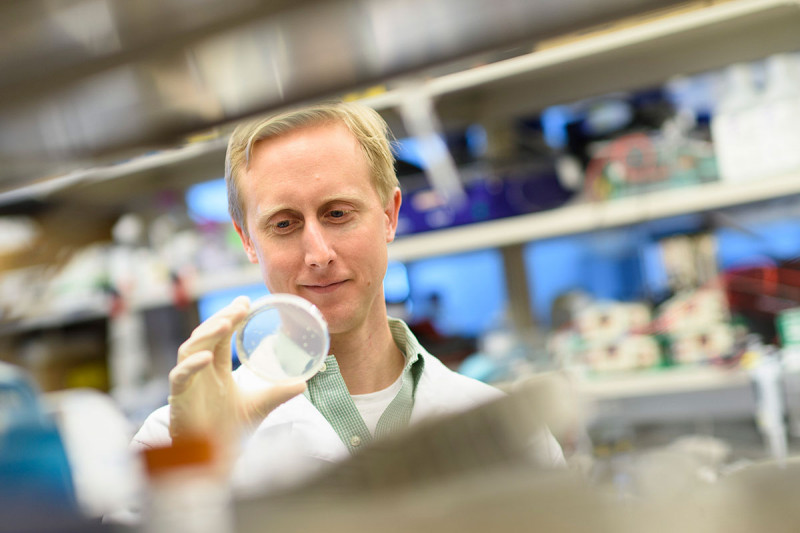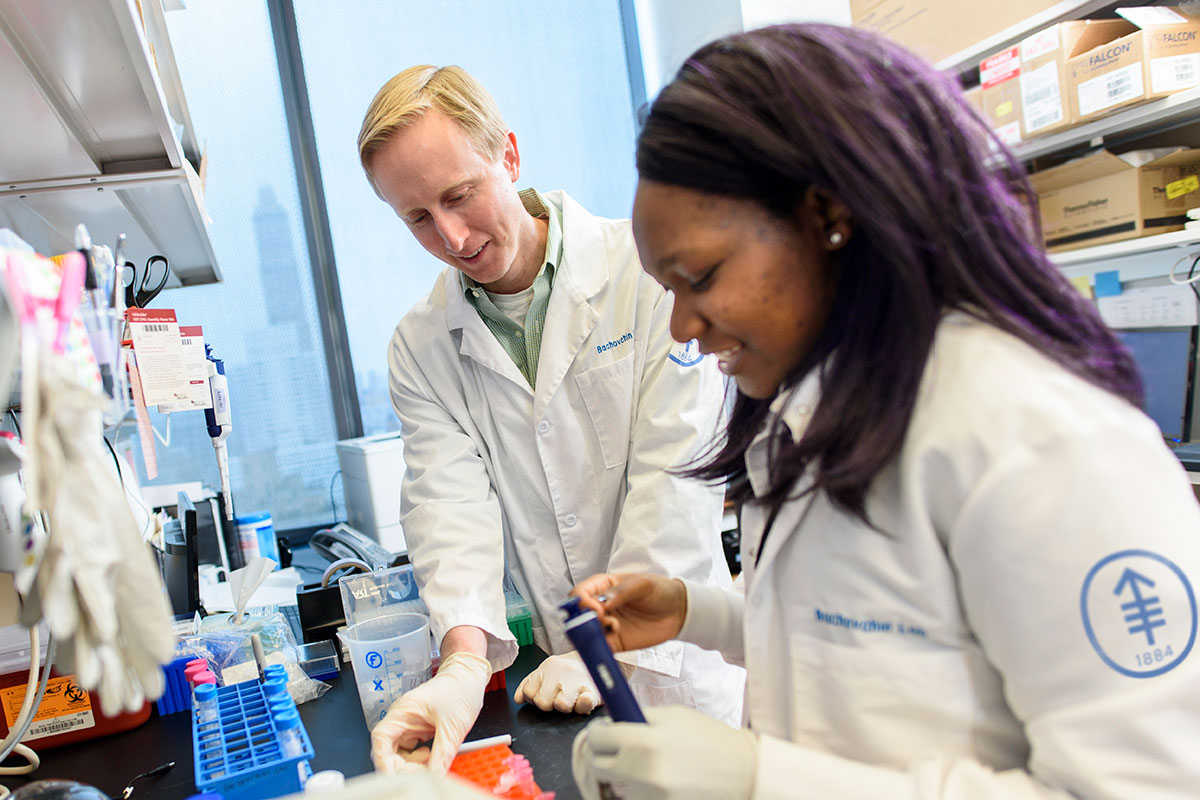
Daniel Bachovchin uses chemical biology tools to study the cellular signals that control immune responses. His laboratory in the Sloan Kettering Institute’s Chemical Biology Program focuses on the roles that enzymes called proteases play in this signaling. Dr. Bachovchin spoke to us in 2018, a few months after he was awarded a Pershing Square Sohn Prize for Young Investigators in Cancer Research.
The best part of my job is being able to see new results every day. I love going to work in the morning having set up an experiment the day before and knowing I’m going to get the answer today. We’ll have a hypothesis, then we do something to test it, and we either confirm or refute it. The idea of probing nature — asking a question in this little lab and getting a definitive answer that no one ever knew before — what could be more fun?
I was interested in science from an early age. My dad is a biochemist. He spent many years studying proteins and their inhibitors, and we always had science materials around the house. In college at Harvard, I enjoyed chemistry classes and the logic of chemical problems. In the summers throughout college, I worked in a research lab in the chemistry department but realized my interests were moving toward biology.

I did my PhD at the Scripps Research Institute in the laboratory of Ben Cravatt, a leader in chemical biology. It was a great place to learn how to monitor enzyme activity and how to design inhibitors that block enzymes. In 2011, I joined cancer biologist Todd Golub’s lab at the Broad Institute of the Massachusetts Institute of Technology and Harvard for postdoctoral work.
Not knowing much about cancer, I started going to seminars and interacting with other researchers. It was a very exciting, vibrant setting where I could apply the skills I’d learned in Dr. Cravatt’s lab to develop new ways to look at enzyme activity and inhibitors. I eventually began looking at small molecules that were enzyme inhibitors with potential anticancer properties.
An Intriguing Drug
One of them was an intriguing drug called Val-boroPro. It had been shown to shrink tumors in mice, but nobody understood exactly how it worked. There was evidence that Val-boroPro induced an immune response, but it was not clear which immune cells were involved or how the drug affected them. I decided to dig deep into the biological process and try to understand what was going on. Studying Val-boroPro became a focus of my research, both at the Broad Institute and continuing when I came to MSK in 2015 to set up my own lab.
Val-boroPro was originally designed to block an enzyme called DPP4, which is now a target for antidiabetic drugs. DPP4 is part of a family of enzymes called proteases. These act like molecular scissors to cut other proteins. We knew Val-boroPro was targeting other proteases as well because we saw an immune response in genetically engineered mice that lacked DPP4.
I started trying to find out what other targets the molecule was hitting. I was greatly helped by the chemical biology approaches I’d learned in the Cravatt lab and discussions with my dad, who spent many years studying such inhibitors. Fortunately, this was also right when the genome-engineering tool CRISPR emerged. I feel very fortunate that I happened to come to scientific maturity at a time when the world dropped the most impressive technological advancement I could imagine for my field. With CRISPR, we could very easily knock out specific genes in immune cells to see how that affected their response to Val-boroPro.
Inflammatory Cell Death
We began trying to unravel the signals involved in the immune response triggered by the drug. In 2016, we discovered that Val-boroPro blocks two key proteases in addition to DPP4: DPP8 and DPP9. When DPP8 and DPP9 are blocked, an enzyme called pro-caspase-1 is activated. This causes a form of highly inflammatory programmed cell death called pyroptosis.
Pyroptosis is a key response of our innate immune system, which protects us against pathogens like viruses and bacteria. Although pyroptosis had been studied extensively, this was the first time we had seen a small molecule drug trigger this kind of cell suicide. It appears that when DPP8 and DPP9 are active, they are constantly preventing pyroptosis from occurring. Blocking DPP8 and DPP9 triggers cell death, inflammation, and immune attack.
Importantly, small molecules that manipulate pyroptosis have many possible therapeutic applications. These molecules might impact not just cancer but many other diseases. These could include autoimmune disorders, metabolic disorders, and infectious diseases.
In a follow-up study we published in July 2018 in Nature Medicine, we found that inhibitors of DPP8 and DPP9 could trigger pyroptosis in the human blood cancer cells called myeloid cells. These cells are the ones affected in acute myeloid leukemia (AML). The drug killed the myeloid cells in a lab dish, and it slowed the progression of AML in mice. This marked the first time anyone had activated pyroptopic cell death to directly kill cancer cells.
One surprising part of this finding was that mice and humans use a different protein to activate the pro-caspase-1 enzyme that triggers pyroptosis. We now can focus on the human protein to understand exactly how it triggers pyroptosis. We also want to further investigate why there is this intriguing difference between species. Understanding that could guide us in further experiments.
A New Avenue of Immunology Research
We now have molecular control over a vital part of the immune system to start answering important questions. MSK is the ideal place to pursue answers to these questions. When we wanted to test Val-boroPro on different immune cell types, there were multiple labs that had developed different cell lines. By collecting these cells and seeing which ones responded, we could start to tease out what was going on. Under Derek Tan’s leadership, all the labs in the Chemical Biology Program have their own focus but excel in applying chemical insights to the study of biological systems.
My guiding principle is that the truth is always the most interesting possible result. You may hold to a certain hypothesis and hope it proves correct. But if the answer surprises you, learn how to adapt quickly. That’s important in science and in life.
In my free time, I like doing something outside that’s active. Every weekend I try to go road cycling or swimming, and I’ve done competitive open water swims and other races — although probably less lately. It’s been a busy couple of years.



